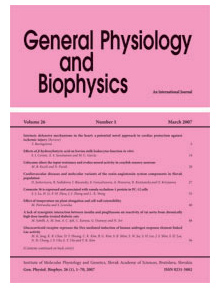General Physiology and Biophysics Vol.41, No.1, p. 43–51, 2022
|
| Title: Leonurine exerts a protective effect in dextran sodium sulfate-induced experimental inflammatory bowel disease mice model |
| Author: Le Qi, Xi Chen, Ying Pan, Zhiyi Zha, Min Tang, Change Shi, Bingbing Yang, Hongqian Wang |
|
Abstract: Inflammatory bowel disease (IBD) is a common chronic inflammatory gastrointestinal disease. The therapeutic strategies of IBD are limited. IBD mouse models were established by administering 4% dextran sodium sulfate (DSS), which were further treated with Leonurine (7.5, 15, 30 mg/kg). The disease phenotypes, cell apoptosis, inflammation factors and oxidative stress related chemicals were evaluated. In addition, the potential related mechanism was also explored. Consequently, Leonurine ameliorated IBD-associated disease phenotypes and increase colon lengths and inhibited intestinal cell apoptosis in DSS-induced IBD mice. In addition, Leonurine reduced the expression of inflammation factors and oxidative stress level in DSS-induced IBD mice. Finally, Leonurine inhibited TLR4/NF-κB signaling pathway and activated of Nrf2/HO-1 signaling pathway. Leonurine can ameliorate IBD-induced apoptosis, inflammation response and oxidative stress via the activation of Nrf2/HO-1 signaling pathway and suppression of TLR4/NF-κB pathway.
|
|
| Keywords: Leonurine — Inflammatory bowel disease — Apoptosis — Oxidative stress — Nrf2/HO-1 signaling pathway — TLR4/NF-κB pathway |
|
|
Published online: 14-Feb-2022
|
| Year: 2022, Volume: 41, Issue: 1 |
Page From: 43, Page To: 51 |
doi:10.4149/gpb_2021044
|
|
 download file download file |
|
|
|
|
 download file
download file
